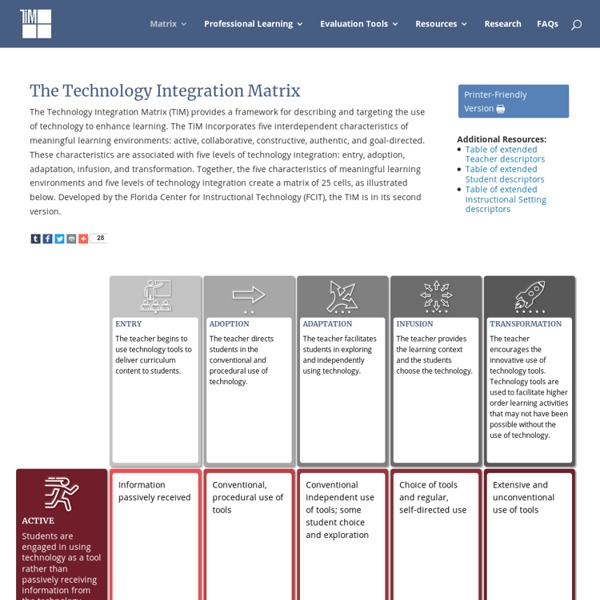



You Want iPads For Your School ... But Is That Enough? Everywhere I turn schools seem to be buying iPads. Critics, even in this forum, question whether investment in a relatively new and untested technology can be justified, especially given the current economic climate. To some degree, I think their scepticism has merit. Buying iPads for your school may not improve the standard of education. Technology is a tool. The issue of greater consequence should be how you plan to use them. "How will I use new technology to change the fundamental practice of education?" You see, without a clear vision your educational dollars may in fact be wasted. If you want iPads so that you can distribute digital reading material to support a largely teacher driven, content based program ... it's not enough. If you want iPads so that children can practice drills without any knowledge or context of how the skill being drilled has relevance to their daily life ... it's not enough. On the other hand... Sam Gliksman Email: samgliksman@gmail.com
In Classroom of Future, Outdated Testing Can’t Keep Up And this is where Richtel buries the lead, in paragraph 42, about a third of the way through the article: "Karen Cator, director of the office of educational technology in the United States Department of Education, said standardized test scores were an inadequate measure of the value of technology in schools. Ms. Cator, a former executive at Apple Computer, said that better measurement tools were needed but, in the meantime, schools knew what students needed." Dawson carries the point further, saying that standardized tests only measure students' abilities to take tests, and can't gauge intangible skills such as collaboration and critical thinking. Richtel also neglected to point out an important piece of the puzzle: that standardized assessments are in the process of being recreated. Tom Vander Ark, who was quoted in Richtel's piece, thinks the writer was not as forthcoming as he could have been. Richtel could have also found a better headline for the story.
Visuals : Facebook and College Admissions by Loreal Lynch | April 6, 2011 As Facebook has become more and more popular—if it were a country, it would be the third largest in the world—its use in the field of education has expanded, too. In fact, more than 80 percent of college admissions officers report using Facebook as part of their recruiting process. Are admissions officers really looking at the Facebook profiles of prospective students? And if so, are they making admissions decisions based on these profiles? Below is an infographic that highlights the answers to these questions and more, and it might surprise you. Embed in your site: <a href=" src=" alt="Reading students like an open facebook, or how social media is reshaping college admissions" width="605" height="2145" border="0" /></a><br />Courtesy of: <a href=" About the Author
The Best Resources For Helping Teachers Use Bloom’s Taxonomy In The Classroom Bloom’s & SOLO ‘are not Just Colorful Posters we Hang on the Wall’ is my two-part series at Education Week Teacher. Bloom’s Taxonomy is talked about a lot in educational circles. However, if you believe a recent survey of visits to 23,000 U.S. classrooms, the higher-order thinking skills it’s ideally designed to promote doesn’t get much use. And I can understand why. It’s easy to get caught-up in the day-to-day work involved in teaching a class or multiple classes, and it’s easy to fall into the trap of doing the “usual stuff” and not “think out of the box.” I thought it might be useful to share in a “The Best…” list the resources that help me try to use Bloom’s Taxonomy in my classroom. There may very well be resources out there that do a far better job of explaining the Taxonomy and how to use it. I personally try to use Bloom’s Taxonomy in two ways. In addition, I try to use Bloom’s to help me formulate my own lessons. Bloom’s Revised Taxonomy Memory Understanding Applying and Analyzing
Collaborize Classroom | Online Education Technology for Teachers and Students Want Success in Silicon Valley? Drop Out of School Bloomberg NewsPeter Thiel Parents, do you hope that your children have the chance to become like Peter Thiel, the PayPal co-founder, Facebook investor and hedge fund manager? If so, Mr. On Wednesday, the Thiel Foundation, funded by Mr. More than 400 people applied. The fellowship addresses two of the country’s most pressing problems, Mr. Much of the technological talent these days is going into Web sites and apps. Mr. “We’re not saying that everybody should drop out of college,” he said. “I believe you have a bubble whenever you have something that’s overvalued and intensely believed,” Mr. In Silicon Valley, following in the footsteps of Bill Gates, Mark Zuckerberg and Evan Williams by dropping out of school might make sense. But Mr. “I think a program like this would have been unthinkable in 2007, but I think you increasingly have people who are graduating from college, not being able to get good jobs, moving back home with their parents,” he said. Mr.